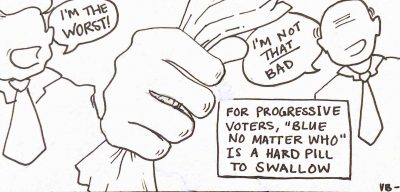We’re less than two weeks away from a presidential election that could very well be the most consequential decision of our lifetime.

The two candidates, President Donald Trump and former Vice President Joe Biden, couldn’t be more different in style, policy or experience. One is a former reality TV star and raging megalomaniac while the other is a life-long centrist politician who is practically the human embodiment of watching paint dry.
The fate of our democracy and future as a country lie in the hands of these two privileged, old white men. What could go wrong?
All sarcasm aside, the massive faults of each candidate inspire very little confidence in the hearts of voters and it begs — to borrow some Shakespearean verbiage — the question: to vote or not to vote?
This debate is a broad one that encompasses a plethora of perspectives that are impossible to compile into a single piece. Instead, I’ve chosen to discuss this argument in the context of a recent debate between Sen. Bernie Sanders’ former press secretary Briahna Joy Gray and philosopher and political activist Noam Chomsky.
On the Oct. 11 episode of Gray’s podcast, “Bad Faith,” she and co-host Virgil Texas interviewed Chomsky. They delved into an hour-long conversation about the upcoming election and how voters on the political left should proceed.
Two general schools of thought stem from this conversation.

Chomsky advocates for the idea of a “lesser of two evils.” He argues that voters should vote for Biden, even if he does not fully represent their views and interests, because the alternative of a Trump victory is far too dangerous and existential.
“Real politics consists of constant activism,” Chomsky said. “Every once in a while, an event comes up in which you have to take a couple of minutes to decide whether it’s worth pushing a lever to keep out someone who’s truly dangerous.”
Gray’s school of thought is a rejection of that “lesser of two evils” thinking. Instead, she argues that if all progressives vow to stand behind whomever the Democratic nominee is, just because they are incrementally better than the Republican, then the Democratic Party has zero incentive to shift their policies and rhetoric to the left.
“By withholding one’s vote, by saying I’m not going to vote for Biden or, as you say, against Trump, unconditionally,” Gray said, “you could continue to push Biden to the left at a time when he is most vulnerable because of his electoral position.”
Gray likened this tactic to the voting patterns of unified groups such as unions.
“In the same way that voting blocs like unions have been able to coordinate masses of voters and deliver them to politicians in return for certain promises,” Gray said, “some portion of progressives … could condition one’s vote for Biden, against Trump, on Joe Biden delivering some goods.”
A major point of contention between the two schools of thought is whether a vote withheld from one candidate is the same as an active vote for their opponent.
Gray’s camp contends that a vote withheld from Biden is not comparable to an active vote for Trump, but rather an indication that Biden did not meet the conditions posed by voters. Chomsky contended the opposite.
“Not voting for one candidate, not voting for Biden, is equivalent to putting Trump one vote ahead,” Chomsky said.
While Gray and Chomsky had much more to say about their positions, this is where I have to interject.
The question of whether to vote or not to vote has been one that has weighed heavily on my mind in the last few months of this election cycle. Depending on the day, I could have fallen on either side of the argument.
Gray made the point that the problem with the “vote blue no matter who” logic is that those who suffer under the status quo of American politics never get the chance to have their issues addressed because politicians’ main priority is maintaining that status quo.
In that, she is absolutely right. Voting for Biden is ultimately a return to the status quo of the Obama-Biden administration, a status quo that left so many people vulnerable and struggling. It’s a return to the half-measures and incremental change that won’t result in the overwhelming upheaval of the system we Americans desperately need.
But despite all of those valid reasons not to vote, I still dragged myself out of bed last week, drove to the early voting location in my area and cast my vote for Biden.
Not only do I believe that voting is a sacred right we should treat with the utmost seriousness, I also couldn’t find a single fault in another point of Chomsky’s:
He says there is a misconception that joining with the half of the population that doesn’t vote will influence the Democratic Party to care more about these non-voters’ issues. However, there are slim odds this approach would work — the party doesn’t pay attention to the half that doesn’t vote.
Chomsky couldn’t be more correct.
Think about the outcome of the 2016 election. Many mainstream liberals, including Hillary Clinton herself, blamed Clinton’s loss on voters who chose third-party candidate Jill Stein. They argued that any vote not for Clinton was a vote for Trump.
To be clear, I don’t attribute Clinton’s electoral loss to Stein voters at all. But, many party establishment figures believed progressive and independent voters who withheld their vote were to blame.
In response, the Democratic Party didn’t move to the left. Instead, party elites such as former President Barack Obama pulled strings behind the scenes to ensure a Biden victory in the primary — though that’s a larger conversation for another time.
In response to voters withholding their votes, the point is this: the party didn’t move left, but it did reject those voters and happily bid them farewell. Withholding votes didn’t work then and I’m extremely doubtful it’ll work now.
To be frank, voting for Biden was not a fun or enjoyable task. I don’t love the fact that he could be the next president of the United States.
But when it comes down to a binary choice such as this one — where one end of the spectrum is a white supremacist, disgusting monster and the other end is a corporatist who will guide us back to the status quo — unfortunately, the choice is clear.
We are on the brink of an existential election and we need to use our vote to save ourselves from a grim and devastating fate.



















































































































